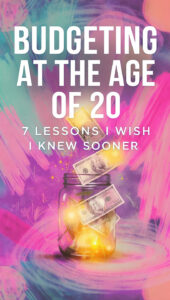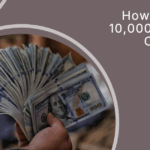Now Reading: BUDGETING IN YOUR 20s: 7 LESSONS I WISH I KNEW SOONER 💸💔
-
01
BUDGETING IN YOUR 20s: 7 LESSONS I WISH I KNEW SOONER 💸💔
BUDGETING IN YOUR 20s: 7 LESSONS I WISH I KNEW SOONER 💸💔
so as i turned 20 i had realized that your 20s aren’t just about surviving… they’re about setting yourself FREE.
no one hands you a budget manual on your 18th birthday.
Instead, you’re thrown into a world of rent, credit cards, brunch dates, and suddenly… debt you didn’t even realize you were creating. 💳
If you’re in your 20s and feel like money is just happening to you, not for you — you’re not alone.
I wish someone had sat me down and shared this when I was younger.
So today, I’m being that person for you. 💕
Here are the 7 money lessons I learned the hard way — so you don’t have to.

💡 1. Budgeting Isn’t Restriction — It’s Freedom in Disguise
I used to think a budget meant “no fun” — like saying goodbye to coffee runs, travel dreams, and cute dresses.
But the truth?
A real budget lets you say YES to the things that matter most.
It’s not about cutting everything. It’s about choosing what actually brings you joy — and letting go of mindless spending that doesn’t.
✨ If you’ve ever reached payday and wondered “where did all my money go?” — it’s time to get intentional, not restrictive.
🚫 2. Stop Living Paycheck to Paycheck — Even if You’re Earning Peanuts
Even on a small income, you can build a cushion.
The trick?
-
Track every dollar (yes, even that $4 latte)
-
Know your non-negotiables (rent, food, transport)
-
Then set tiny savings goals — $20/week adds up to $1,000+ in a year 💥
When you plan ahead, emergencies don’t feel like tsunamis.
They feel like puddles you know how to step around.
🧾 3. Your First Budget Will Suck — And That’s Okay
No one nails it on the first try.
You’ll forget categories. You’ll overspend. You might cry.
But guess what? That’s part of the process. 🌱
Budgeting isn’t a one-time setup — it’s a monthly check-in with your money. Like a friendship that gets better the more you show up for it.
💬 “I failed at budgeting” really just means “I learned what didn’t work.” Keep going.
💳 4. Credit Cards Are Tools — Not Free Money
In your 20s, credit cards can feel like magic. Swipe now, worry later.
Until “later” becomes a $3,000 bill with interest breathing down your neck.
Use credit smartly:
-
Only charge what you can pay off monthly
-
Never miss a due date — automate it if needed
-
Build credit for future you (hello, mortgage & travel rewards ✈️)
You can absolutely use credit to your advantage — but only when you’re in the driver’s seat.
🎯 5. Set One “Why” That Makes You Want to Stick to Your Budget
Let’s be real — budgeting for the sake of budgeting won’t last.
You need a why that fuels you on the hard days:
-
“I want to move out and have my own space”
-
“I never want to stress about money again”
-
“I’m building a life I don’t need a vacation from”
Put it on a sticky note. On your mirror. On your phone background.
Let that vision guide your financial decisions.
🧠 6. Learn Before You Burn — Know Where Your Money Goes
In your 20s, it’s easy to ignore the “boring” stuff — interest rates, hidden fees, late payments.
But financial peace isn’t about being rich. It’s about being aware.
Start now:
-
Use free apps like Mint, YNAB, or Spendee
-
Track spending for 30 days — you’ll be shocked where it goes
-
Schedule a monthly “money date” with yourself 🕯️
Knowing your habits = power. And power = choices.
🛑 7. Saying “No” to Others is Saying “Yes” to Your Future Self
Girls’ trips. Fancy dinners. That one friend who always says “split the bill” even when she ordered champagne and oysters. 🍾😅
It’s okay to opt out sometimes.
💬 “I’m on a budget right now” is a full sentence.
The people who matter will respect it. And your future self — the one with paid-off debt, savings, and confidence — will thank you.
📌 Save this. Read it twice. And know this:
It’s okay to be figuring this out in your 20s.
You’re not behind — you’re building. And every step matters. 💖
Here’s how to take control — one step at a time.
🧰 1. Start With a “No-Judgment” Money Audit
Before you can fix or build anything, you need a clear view of where your money is going right now.
Open your bank app, credit card statement, or budgeting app and look at the last 30 days.
Write down:
-
Total income 💵
-
Total fixed expenses (rent, bills, subscriptions) 📦
-
Variable spending (food, fun, gas, etc.) 🍕🛍️
-
Any debt or savings activity 💳💰
This is not about feeling guilty.
It’s about getting real — so you can get free.
📊 2. Build a 3-Category Budget (So Simple It’s Foolproof)
Budgeting doesn’t have to be complicated. Especially not in your 20s.
Break your monthly money into just 3 buckets:
-
Needs (Rent, groceries, bills) — 50–60%
-
Wants (Dining out, shopping, fun) — 20–30%
-
Goals (Debt, savings, investing) — 10–20%
✨ Pro Tip: Use percentages as a starting point. Adjust based on your lifestyle, especially if your income is tight or irregular.
💳 3. Automate Everything You Can
The less energy your budget requires, the more consistent you’ll be.
Set up:
-
Auto-pay for bills (to avoid late fees)
-
Auto-transfer to savings each payday (even if it’s just $25)
-
Auto-credit card payment (at least the minimum!)
You want your money to move on your behalf, even when life gets chaotic.
💡 4. Start a “Baby Emergency Fund”
Don’t wait until something breaks or someone gets sick to build your safety net.
Aim for $500–$1,000 in a simple savings account — just for emergencies.
This will protect you from relying on credit cards the next time life throws a surprise your way.
Name the account something encouraging like:
➡️ Peace Fund
➡️ Future Me
➡️ Emergency Glow-Up
Make it emotional. That makes it stick.
🏦 5. Open Multiple Bank Accounts (One Job Each)
Split your income like a queen who runs her empire.
Examples:
-
Checking account = Spending
-
Savings #1 = Emergency fund
-
Savings #2 = Travel fund, holiday gifts, or “treat yourself” stash
-
High-yield savings = Longer-term goals
This helps you avoid the “oops-I-spent-my-rent-money” moment — because each account has a job.
🧾 6. Track Weekly, Not Just Monthly
Waiting until the end of the month to check your budget = disaster.
Set a 15-minute weekly check-in:
-
Review spending
-
Adjust if needed
-
Celebrate wins (like “I brought lunch 3 days!”)
It’s like brushing your financial teeth. Do it often. Keep it fresh. 🪥💸
📈 7. Start Investing (Yes, Even If It’s $5)
If your company offers a 401(k) or pension match — take it. It’s free money.
If not, open a Roth IRA or use beginner apps like Acorns or Fidelity.
💬 “I’ll start later” turns into “why didn’t I start sooner?”
Even $25/month in your 20s can grow into thousands thanks to compound interest.
This is how women build quiet wealth. ✨
❤️ Give Yourself Permission to Grow (and Mess Up)
You’ll miss a payment. You’ll blow the budget on a weekend trip. You’ll forget to track something.
It’s okay.
Budgeting isn’t about being perfect. It’s about coming back every single month, a little wiser than before.
So be kind to yourself.
Because if you keep showing up for your money, it will start showing up for you in ways you never imagined.
📌 Pin this post or journal it out.
This is your starting line, not your final destination. And the fact that you’re even thinking about money in your 20s? That’s rare. That’s powerful. That’s how generational wealth begins.














